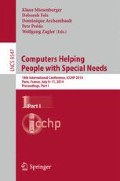Abstract
The paper gives a short overview on the topic of Massive Open Online Courses and providers of MOOC infrastructure. Selected MOOC-platforms are reviewed for accessibility with different set-ups of common screen-reading software and browsers. No platform was fully accessible, most lacked correct language markers and an accessible design. The results show that accessibility was not in focus when the platforms where built, thus excluding impaired people and not fulfilling the claim that MOOCs are open to everyone.
Access this chapter
Tax calculation will be finalised at checkout
Purchases are for personal use only
Preview
Unable to display preview. Download preview PDF.
References
Meister, J.: How Moocs Will Revolutionize Corporate Learning and Development, Forbes Online (2013), http://www.forbes.com/sites/jeannemeister/2013/08/13/how-moocs-will-revolutionize-corporate-learning-development/
Pappano, L.: The Year of the MOOC, The New York Times (2013), http://www.nytimes.com/2012/11/04/education/edlife/massive-open-online-courses-are-multiplying-at-a-rapid-pace.html?pagewanted=all
Schulmeister, R. (ed.): MOOCs – Massive Open Online Courses. Waxmann, Münster (2013)
Sanchez-Gordon, S., Luján-Mora, S.: Web accessibility of MOOCs for elderly students. In: 12th International Conference on Information Technology Based Higher Education and Training (ITHET 2013), Antalya (Turkey), October 10-12, pp. 1–6 (2013)
Stokes, P.: The Particle Accelerator of Learning, p. 31. Inside Higher Ed. (May 2013)
Parr, C.: Mooc creators criticise courses’ lack of creativity. Times Higher Education (2013), http://www.timeshighereducation.co.uk/news/mooc-creators-criticise-courses-lack-of-creativity/2008180.fullarticle
Bildungsprojekt Udacity, Hochschulbildung, kostenlos und für alle, http://www.zeit.de/studium/uni-leben/2012-01/udacity-thrun
Wu, W.: During the Online Symposium for Accessible E-Learning (December 16, 2013), Transcript at http://www.w3.org/WAI/RD/2013/e-learning/
Author information
Authors and Affiliations
Editor information
Editors and Affiliations
Rights and permissions
Copyright information
© 2014 Springer International Publishing Switzerland
About this paper
Cite this paper
Bohnsack, M., Puhl, S. (2014). Accessibility of MOOCs. In: Miesenberger, K., Fels, D., Archambault, D., Peňáz, P., Zagler, W. (eds) Computers Helping People with Special Needs. ICCHP 2014. Lecture Notes in Computer Science, vol 8547. Springer, Cham. https://doi.org/10.1007/978-3-319-08596-8_21
Download citation
DOI: https://doi.org/10.1007/978-3-319-08596-8_21
Publisher Name: Springer, Cham
Print ISBN: 978-3-319-08595-1
Online ISBN: 978-3-319-08596-8
eBook Packages: Computer ScienceComputer Science (R0)

